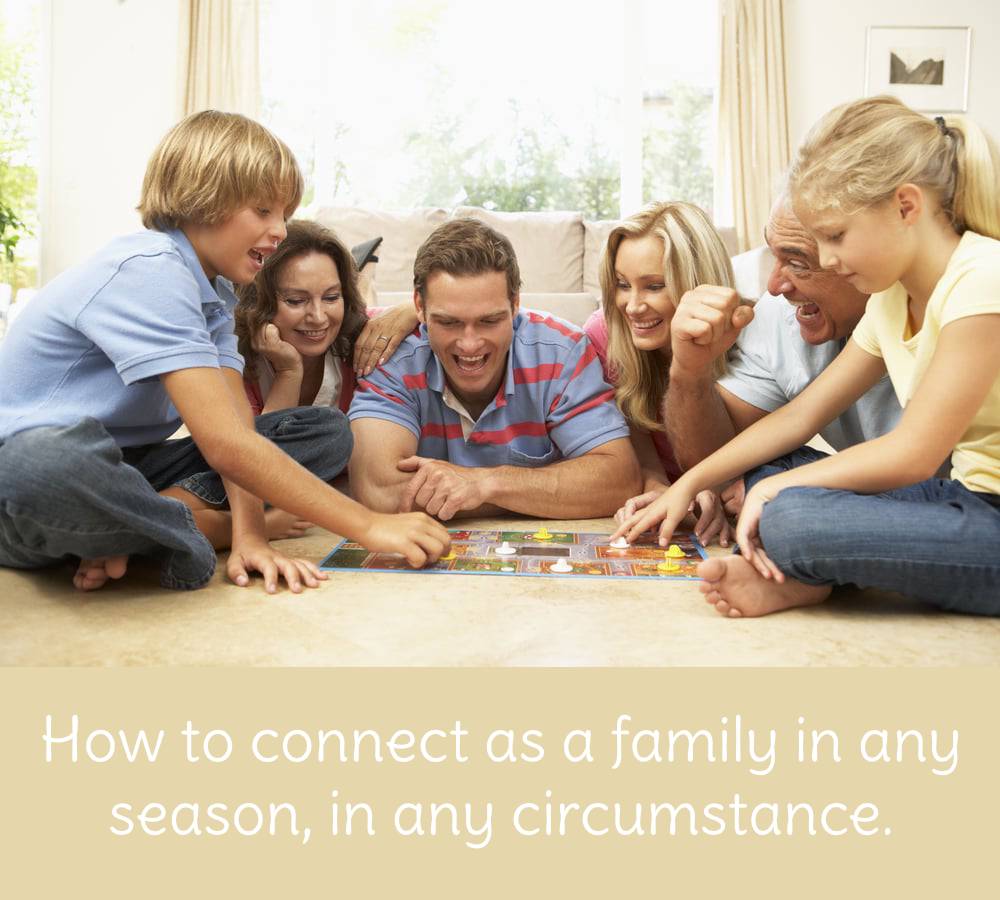Connect With Your Family All Year Long

Every season of the year is a perfect time to connect with your family. Do you think that is a true statement? Let’s think about it.
Fall and Winter
How do you look at the season of fall and winter? Do you anticipate that this time of year will be enjoyable or not? Your viewpoint is likely dependent on your family’s ability to live in community. If your family finds it easy to gather around the hearth you aren’t bothered by the cold and darkness. But, if your family becomes testy when in close quarters, then you sense some dread as the daylight shortens.
Most families find it easy to live in close proximity during the start of fall because Thanksgiving and Christmas were close at hand. They have ample opportunity to work side by side on preparations. (Honestly, some of my favorite family memories took place during the shortest days of the year.)
But, by January, cabin fever always seemed to creep in. Parents begin to insist that children go outside to play to avert major family strife.
Spring and Summer
As spring approaches, the tension of living close together does fade. There is something about the warmer days and the longer stretches of warm sunshine that temper the family’s ability to overlook annoyances and show kindness in the face of conflict. Certainly, the shift in weather renews a sense of connectedness and growth within the home.
Probably the season of summer is most conducive to family connectedness. Schedules relax allowing for more time to ‘be’ family and enjoy hobbies and activities that are enjoyed by the clan.
Connecting in Any Season
We all know that a proper attitude determines how well we connect with our loved ones During any season of the year. What you expect sets the course towards either joy or despair. If you want to enjoy rather than endure any season, consider ways that you can connect as a family and live in charity under one roof.
Connecting family members together requires two basic elements: responsiveness and demandingness. What is responsiveness? This is your ability as a parent to be with your family. To be with means that you make time for them, listen to them and enjoy them. It requires you to slow down and regularly interact rather than constantly busy yourself with your own activities. To be with means that you become fully engaged – especially in the ordinary routines of each day (think cleaning or doing laundry or picking up before retiring.)
What is demandingness? These are the limits, consequences and expectations that you create which enhance the common good of the family. A few obvious examples include to expect your family (including yourself) to keep your home organized – specifically in the high traffic parts of the house, listening to others without interruption, using inside voices, and gaining permission to bring friends over. Less evident examples include joining the family at dinner, scheduling household chores, parking all electronic devices during family meals and designating bedrooms as no-device zones.
Family specialists tell us that the combination of high love and high expectations brings out the best in everyone and creates a certain family charm. Family members seem to care more about the each other when both are present because a sense of peace and security exists. This is when people flourish.
The Catholic Church also teaches the importance of high love and high demands. Saint Pope John Paul II wrote, “The love that animates the interpersonal relationships of the different members of the family constitutes the interior strength that shapes and animates the family communion and community… Family communion can only be preserved and perfected through a great spirit of sacrifice…” (Familiaris Consortio #21)
Love and expectations – both are essential for family unity. Consider every season of the year as a gift to you from God; a gift that allows you to slow down and connect with your family. Take advantage of the season to rediscover the goodness of being a family.
